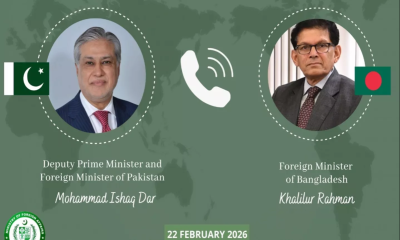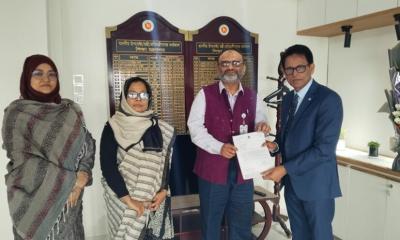Prime Minister Sheikh Hasina in her speech at the UN General Assembly on Friday reiterated that Bangladesh will continue to promote democracy and rule of law as per its constitution.
“In this session today, I would like to unequivocally reiterate that Bangladesh will continue to promote democracy, rule of law and freedom of expression in line with Bangladesh’s constitution,” she said.
The premier said this while addressing the general debate of the 78th session of the United Nations General Assembly at the UN headquarters.
The premier delivered her speech for the 19th time at the UN general session. Like previous years, she delivered her address in Bangla following the footsteps of the Father of the Nation Bangabandhu who had addressed the UNGA first in Bangla in 1974.
Hasina said it needs to be ensured that the human rights issues are not politicised to put pressure on developing countries.
Noting that this year marks the 75th anniversary of the adoption of the Universal Declaration of Human Rights (UDHR), she said “On this auspicious occasion, we must reinforce our commitment to our common humanity and take collective action to advance equality, justice and freedom for all human beings. At the same time, it is to be ensured that human rights are not politicised to put pressure on developing countries,” she added.
She said Bangladesh’s Constitution guarantees fundamental human rights for all. “Over the last decade, significant reforms have been made to our legal system to ensure equal legal protection and access to justice for everyone. As a responsible State Bangladesh is fully committed to protecting and promoting the human rights,” she added.
As an elected member of the Human Rights Council, Bangladesh is working with the fellow members states towards safeguarding all human rights of people around the world.
Work collectively for peace instead of confrontation: PM tells world leaders
The prime minister urged the world leaders to work collectively for enduring peace and economic prosperity for the future generations.
“My appeal today is to all of you - to the leaders of the world, to shun the path of war and confrontation, and to work collectively for enduring peace, welfare for humankind and economic prosperity for our people and future generations,” she said.
In her speech she focused on various issues like global economic crisis, global peace and stability, Rohingya crisis, climate change, 2030 sustainable global agenda (SDGs), human rights and the development of Bangladesh since 2009.
Hasina said this year’s theme of the UNGA is very much relevant in the context of the volatility and complexity the world is facing currently.
“People’s trust in the effectiveness and legitimacy of the international organization is gradually being eroded. As a result, our overall progress towards a peaceful and prosperous common future is faced with threats,” she said.
She said the impacts of the pandemic, the effects of an existential climate crisis, and the wide ramifications of the war in Ukraine affecting global food, financial, and energy securities have greatly impeded the achievement of SDGs in developing countries.
The PM deeply appreciated the UN Secretary-General’s initiative to convene the “Summit of the Future” next year. “We hope that this process will amply complement our efforts to attain the 2030 Agenda,” she said.
“We must make all efforts to collectively address the common challenges of humanity to secure a peaceful, prosperous, and sustainable future for all. And, for that, we must choose unity, solidarity, and multilateralism over fragmentation, insularity and isolation. Our pursuit of peace and sustainable prosperity must follow the principles of fairness, justice, and equity guided by the 2030 agenda and the UN Charter,” she added.
Let’s bring Rohingyas hope of a brighter future in own land, foster regional stability: PM
The prime minister said Bangladesh gave shelter to the Rohingya people, displaced forcibly from Myanmar, on humanitarian concern. But the world witnessed the completion of six years of the mass displacement of the Rohingyas.
She said the situation has really turned unbearable for Bangladesh now. The prolonged presence of the Rohingyas in Bangladesh has caused serious ramifications on the economy, environment, security, and socio-political stability in Bangladesh, she said.
“Uncertainty over repatriation has led to widespread frustration. This situation can potentially fuel radicalisation. If the problem persists further, it may affect the security and stability of the entire region, and beyond,” she added.
“The displaced Rohingyas want to return to their own country, Myanmar and live a peaceful life there. Let’s bring those destitute people hope of a brighter future in their own land and thereby foster safety and stability in the region,” said Hasina.
PM calls for a stronger global solidarity in sharing the burden of climate migrants:
Talking about the climate change, the PM said Bangladesh is one of the most climatically-vulnerable countries in the world despite contributing less than 0.47% of global emissions.
“The adverse effects of climate pose serious threats to the security and economic prosperity of our present and future generations. Urgent, bold and ambitious collective actions are needed to address these threats,” she said.
She said Bangladesh is committed to protecting and preserving the environment and biodiversity and pursuing a climate-resilient sustainable development path. In line with the long-term temperature goal set out in Article 2 of the Paris Agreement, Bangladesh is developing its national low-carbon emission strategy and mitigation actions through green initiatives including renewable energy, she added.
The premier said Bangladesh established the “Bangladesh Climate Change Trust Fund” back in 2009 to finance climate adaptation and allocated 480 million US dollars to this fund so far from our own resources.
She said sea dykes, cyclone shelters are constructed; greenbelt and tree plantation initiatives are undertaken for climate adaptation and mitigation purpose.
Bangladesh is implementing the world’s biggest housing project for people displaced by the impacts of climate change in Cox’s Bazar by constructing 139 multi-storied buildings with all necessary amenities to shelter 4,409 climate change-affected families. Under the “Ashrayan” project, a landmark initiative of my government for the landless and homeless people, 5 million people from 8 hundred and 40 thousand families have been provided with houses free of costs, she added.
She said Bangladesh is implementing the “Bangladesh Delta Plan 2100” with the main objective is to achieve a safe, climate-resilient and prosperous delta through coordinated delta management process. “My government has undertaken “Mujib Climate Prosperity Plan”. We are working to ensure our gradual transition from climate vulnerability to climate resilience,” she said.
Mentioning that more than six million people are using solar home systems, she said Bangladesh is also working for a more sustainable energy mix. “We hope to have 40% of our energy from renewable sources by 2040,” she said.
“We call upon the major emitters to submit and implement ambitious NDCs (Nationally Determined Contributions). The developed economies must fulfill their 100-billion dollars commitments,” she continued.
The PM said the development needs of the climate-vulnerable countries must be considered. “We also demand an urgent operationalization of loss & damage funds as agreed in COP27,” she said.
“We call for a stronger global solidarity in sharing the burden of climate migrants induced by sea-level rise, salinity increase, river erosion, floods, and droughts,” she added.
Continue support during Bangladesh’s graduation from LDC: PM to dev partners
About Bangladesh’s transformation into a developing country, Sheikh Hasina said Bangladesh will officially graduate from the LDC category in 2026.
“I believe, the ongoing multiple global crises will not derail our graduation trajectory. Yet, we reiterate our call to the development partners and the advanced economies to continue to support us during our transition to ease the impact of our graduation,” she said.
She also called upon WTO members to extend to Bangladesh the existing differential treatment available to LDCs for a period appropriate to our development requirement.
Noting that the LDC5 Conference held in Doha, Qatar in March this year ushered in a renewed global commitment to enhance support to the LDCs and graduating LDCs, she urged the United Nations and development partners to ensure full and effective implementation of the Doha Programme of Action.
About the 2030 sustainable global agenda, the PM said financing is one of the most critical factors for a timely achievement of SDGs. “Unfortunately, however, the international financial infrastructure is barely aligned with the SDGs, nor can it respond to the financial needs of developing countries especially during crises,” she said.
“Today, we urgently need an international financial architecture that will help developing countries receive concessional, low-cost, low-interest-rate funds, with minimum conditionalities,” she said.
Besides, developing countries must also have equitable access to IMF’s SDR funds during emergencies and disasters. A special ‘disaster clause’ should be included in all lending instruments, she went on.
The PM thanked the UN Secretary-General for proposing a 500 billion dollar SDGs stimulus package and demand its early operationalisation.
Talking about global situation, she said the interlinked crises of the past few years have pushed up prices of food, energy and commodities globally, weakening our efforts to recover from the pandemic. As an energy-and food-importing country, "our import bills have shot up significantly, having negative impact on our foreign currency reserves", she said.
She said Bangladesh has taken different initiatives to keep inflation under control. “I have called upon our people to grow their own food and leave no cultivable land uncultivated. Our scientists have now developed climate-resilient varieties including drought-and flood- and salinity-tolerant varieties of crops,” she said.
The PM thanked the UN Secretary-General for forming the Global Crisis Response Group in 2022 and for the Group’s continued advocacy and solutions in addressing the global food, energy and financial crises. “As a Champion of this Group, I have always emphasized on sustainable solutions of the problems associated with food exports and its supply chain,” she said.
“We are deeply concerned that the Black Sea Grain Initiative has become defunct and call upon all parties concerned for its early restoration,” she added.
Besides, for the countries like Bangladesh, uninterrupted access to fertilizers must be ensured, said Sheikh Hasina.
“Furthermore, we need global investment in cold chains to preserve the food we produce. I have proposed initiating the regional ‘food banks’ for emergency situations. We must collaborate in research and development of climate-resilient crops,” she said.
Bangladesh to stand by Palestine: PM
Talking about the Palestine issue, the Bangladesh PM said this year also marks the 75th anniversary of Nakba – the catastrophe inflicted upon the people of Palestine. It is deeply troubling that the legitimate rights of Palestinian people have remained unmet. “We will continue our efforts to realize the rights of the people of Palestine. Bangladesh will stand by Palestine,” she said.
Noting that Bangladesh’s commitment to the general and complete disarmament is unwavering, she called for full implementation of the international disarmament and nonproliferation instruments without any delay.
The PM said Bangladesh’s commitment to global peace and security is well manifested in its contribution to UN peacekeeping operations. As of now 188,000 men and women from Bangladesh have served in 55 peacekeeping missions in 40 countries. They have earned reputation for their professional excellence and impeccable performance, she said.
“Owing to our own experience, we are also actively contributing to the post-conflict reconstruction efforts through our leadership role in the UN Peacebuilding Commission,” she said.
The premier said Bangladesh remains concerned at the continued prevalence of terrorist threats which are now taking new shapes due to misuse of information and communication technology. “My government maintains a `zero tolerance` policy against terrorism and violent extremism. We do not allow our territory to be used by any party to incite terrorist acts or harm others,” she said.
“We also remain concerned at the misuse of information technology for instigating violence and spreading hate speech and inflammatory rhetoric. The recent incident of burning copies of the Holy Quran has shaken our conscience. Such acts of perversion not only hurt religious sentiments of the Muslims, they instigate violence and harm peaceful co-existence of people of various faiths and beliefs,” she added.


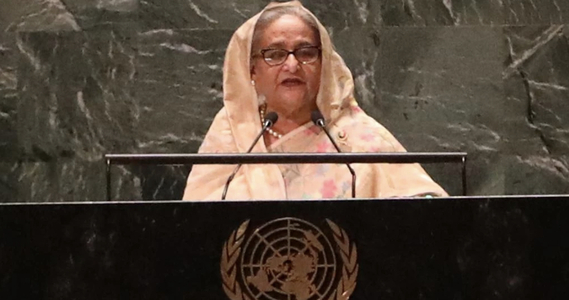

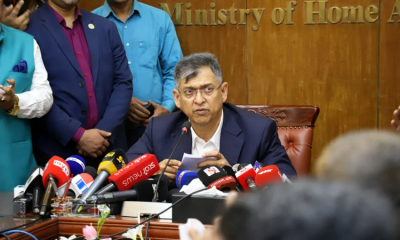
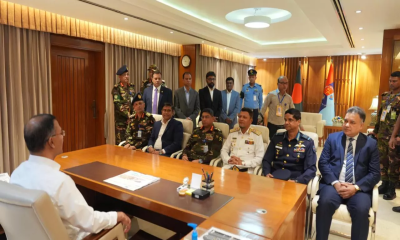
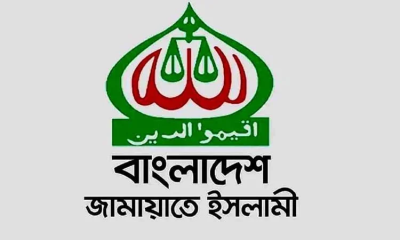
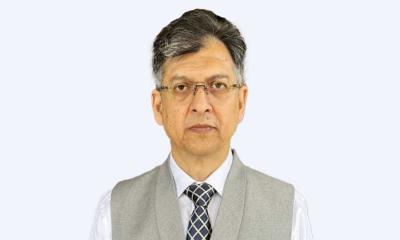
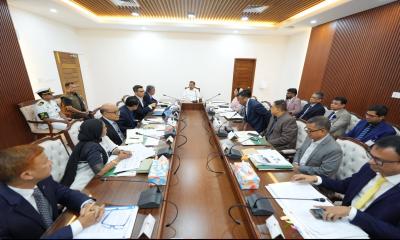
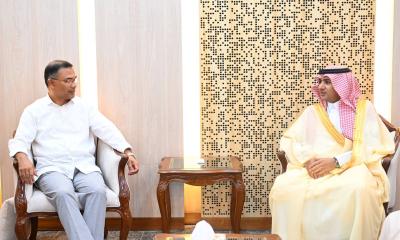
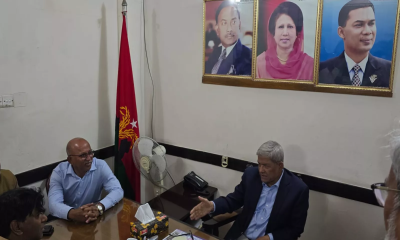
-20260223082704.webp)
-20260223074941.jpeg)
-20260223062301.jpg)


